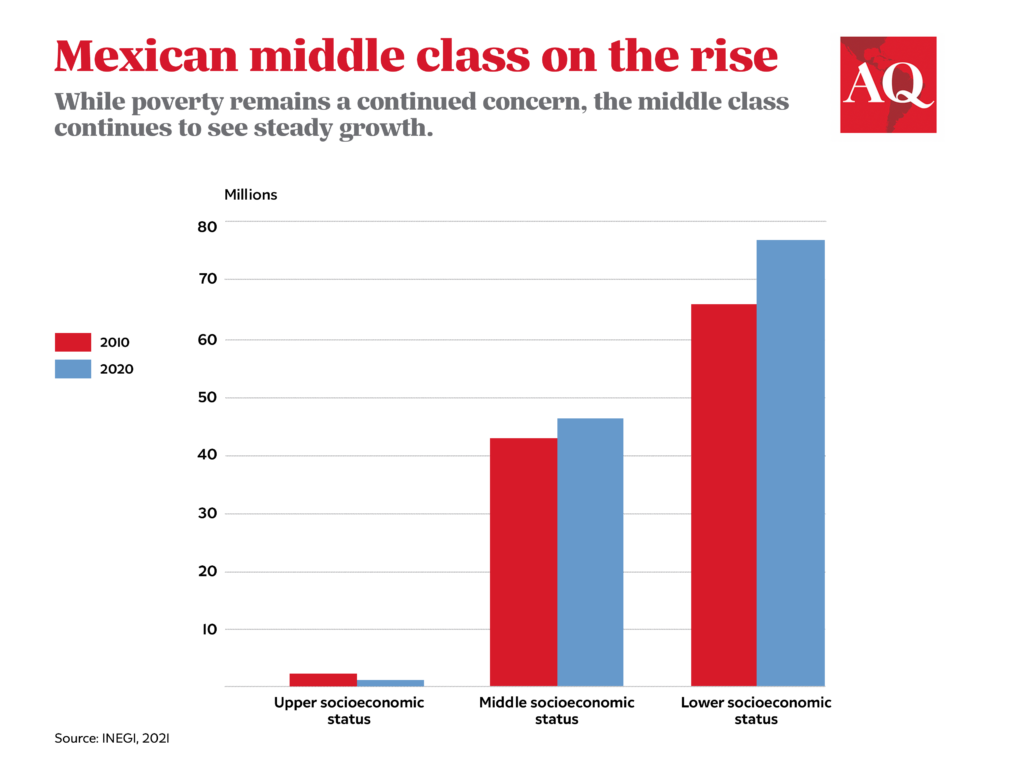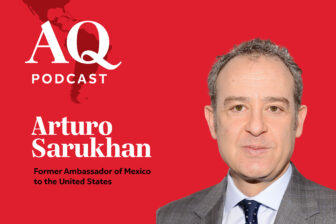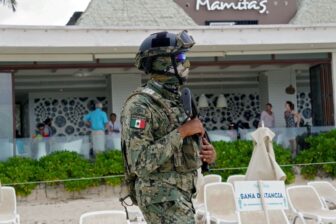Mexico’s President Andrés Manuel López Obrador is a master of playing to his base. To rally public support for the second half of his term—and amid heated debate over priorities like electricity reform and a new oil refinery—López Obrador orchestrated a recall referendum against himself on April 10. Not surprisingly, more than 90% of the 16 million voters (17.5% of the electorate) who participated said they wanted López Obrador to stay on board.
But in continuing to curry favor among his most ardent supporters, López Obrador may be sidelining a group that will be even more important in the run-up to presidential elections in 2024. With key figures from the president’s MORENA party already jockeying to take up the mantle when his term expires, López Obrador could lose support from the middle class in the wake of the pandemic, opening a door for Mexico’s scattered opposition.
It’s a common refrain that AMLO, as the president is widely known, hasn’t enjoyed much support from Mexico’s middle class. But that’s a misperception. In a recent study, Aleister Monfort and Sergio Barcena used electoral sections to build a “wellbeing index” which provides a classification of 10 groups according to the socioeconomic stratums defined in the 2020 census, where 1 is the group worst-off and 10 represents those who are best-off. In both 2018 and in the 2021 mid-terms, Morena obtained more votes than any other party in every socio-economic decile with the exception of the top 10%.
López Obrador has nonetheless referred to the middle class pejoratively as “aspirers and individualists” and as being “without any moral scruples whatsoever.” He frequently attacks institutions such as universities where most employees and beneficiaries are firmly in the middle of the socio-economic spectrum. While the attacks that may be baffling to some voters, more concerning is the lack of effective policies to improve living standards among this group, especially in the wake of the global health—and economic—crisis.
In general terms, “middle class” refers to citizens whose basic needs in food, housing, health and education are broadly met. But while most Latin American countries spent big to respond to COVID-19, López Obrador’s administration spent just 0.7% of GDP to help Mexicans during the crisis. There was no money to support families or to keep small businesses afloat. As the health crisis spread, a massive but incomplete overhaul of the public health system, initiated by the government, meant that many Mexicans were cut off from support that could have come from the recently discontinued Seguro Popular. The change affected government purchases, leading to shortages in vital medications for lower- and middle-class families dealing with cancer and other long-term health challenges. This in the middle of a pandemic.

While the president sees Mexico as a poor country, some 47 million of the total population of 126 million according are neither poor nor rich, according to CONEVAL. Within that group, however, needs vary widely—and many are vulnerable to falling out of the middle class. Life expectancy depends on a variety of factors beyond income, such as access to healthy foods. Some middle-class Mexicans own homes, others rent. Many are at risk of losing their savings entirely if a health crisis arises.
A common aspiration among these shades of gray is a desire to enroll children in private schools. Families often dedicate large proportions of their income towards their children’s tuition. A worthy investment if you consider that according to the OECD, finishing high school in Mexico means adding five years to one’s life expectancy.
What does this mean, looking toward 2024? For starters, it suggests that any candidate looking to succeed will need to offer a credible and concrete plan to help reduce the strains on these families. To gain their support, candidates should propose viable policies to ensure social mobility through access to education and by reducing vulnerabilities caused by a lack of health services. Whoever is able to show how they will create opportunities for close to those 30 million potential voters—60% of the 47 million men and women in the middle class who are 18 and over—will most probably define the next election.
Polarization and political mobilization mean that the top and bottom deciles of the socio-economic spectrum are largely spoken for. The holy electoral grail lies in the middle. Candidates need to re-enchant the middle class that has been battered the health and economic crisis of the pandemic. In Mexico, these voters were left to their own devices, and their vulnerabilities have been exposed and exacerbated. This is where the game-changing political challenge lies, since this time around it will be much harder to “sell” electoral proposals that can be regarded as credible.
Lack of credibility and trust are precisely at the core of the current crisis of politics. Middle-class voters struggle for what they have, don’t want to lose what they’ve achieved and legitimately aspire for more. Thus, social mobility and the reduction of vulnerabilities has become a key element to ignite political interest for those who are part of this ample and complex spectrum. The candidate that is able to connect with this diverse middle class will have a better chance of becoming Mexico’s president in 2024.









